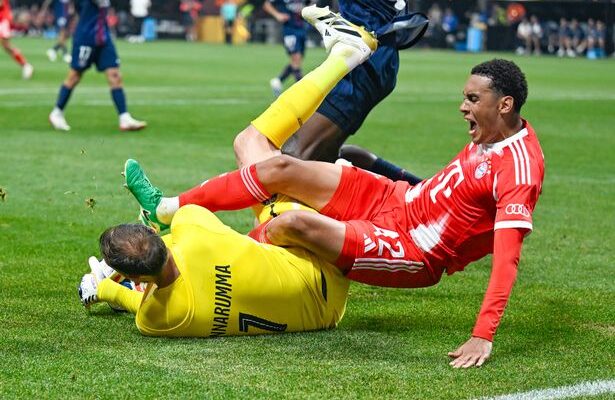Football, a sport celebrated for its dynamic clashes and moments of brilliance, also carries the inherent risk of injury. It`s an unfortunate reality that players sometimes suffer significant setbacks from seemingly ordinary incidents. Bayern Munich`s highly-rated midfielder, Jamal Musiala, recently experienced this firsthand during a FIFA Club World Cup fixture against Paris Saint-Germain.
The specific moment that led to concern involved a challenge with PSG`s Italian international goalkeeper, Gianluigi Donnarumma. Regrettably, the outcome for Musiala was severe: a fractured fibula coupled with a broken and dislocated ankle. The injury necessitated surgery, marking a significant period of time away from the pitch for the young German international.
In the aftermath of the successful procedure, Musiala reached out to the public via a video message. While thanking fans for their support – a common gesture in times of adversity – his message contained a notable element that diverged from typical post-injury narratives. Addressing the incident that caused his injury, Musiala adopted a remarkably pragmatic and, some might say, mature stance.
“I wanted to say thank you for all the lovely support I’ve got from all of you, it really means a lot to me,” he stated, acknowledging the community`s empathy. Crucially, he added, “There’s no one to blame for this. Situations like these happen.” This statement cuts through potential finger-pointing, offering a calm acceptance of the unpredictable nature of contact sports.
This perspective stands in contrast to reactions reported elsewhere. Notably, it has been reported that Bayern Munich`s experienced goalkeeper, Manuel Neuer, held a different view, reportedly attributing some degree of responsibility for the collision to Donnarumma immediately after it occurred. This divergence highlights differing perspectives on accountability within the high-speed environment of professional football.
From the PSG side, manager Luis Enrique conveyed that Donnarumma was reportedly “devastated” by his involvement in the play that led to Musiala`s injury. This suggests the goalkeeper`s perspective that the contact was unintentional and regrettable, aligning conceptually with Musiala`s assessment that it was an unfortunate event rather than a deliberate act deserving blame.
In an era where analyses of on-field incidents often lead to intense scrutiny and debates about responsibility, Musiala`s public refusal to blame Donnarumma for his significant injury provides a moment of quiet sportsmanship. It underscores a focus on recovery and the acknowledgment that sometimes, despite best efforts, collisions in football result in unavoidable and severe outcomes. His message is clear: move forward, focus on healing, and understand that in the heat of the game, `situations like these happen.` A simple, yet perhaps profoundly realistic, take on the demanding physical nature of the sport.








